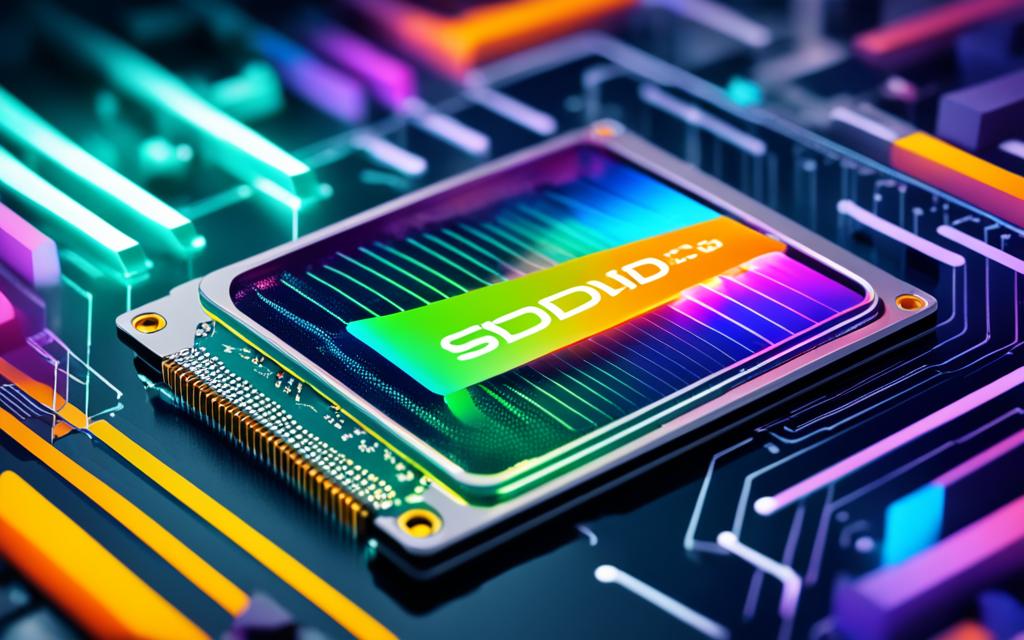Table of Contents
Testing your SSD’s speed is key for top performance and a smooth computer use. Now that SSDs are everywhere, learning to check their speed properly has become vital. High-end SSDs can hit speeds over a thousand megabytes per second, while ordinary ones typically offer 300-600 MB/s for reading and writing data12.
If your computer is slow, it might be time to test and tweak your SSD. This helps figure out if you’ve got a fast SSD or a standard one, ensuring it suits your needs. For gamers, video editors, or anyone working with loads of data, knowing how to check your SSD speed is crucial for staying productive and happy with your computer.
Key Takeaways
- Regularly test SSD speed to maintain optimum performance.
- Performance analysis can reveal the necessity of upgrades for intensive tasks.
- Tools are available for various operating systems, including built in options.
- Knowing the read/write speeds helps evaluate the efficiency of your SSD.
- Affordable SSDs are widely available and can greatly enhance system performance.
Understanding SSD Read/Write Speed
Getting to know SSD read and write speed is key to judging their performance. It tells us how fast data can be read from or saved to these drives.
What is SSD Read Speed?
SSD read speed is how quickly data is pulled from the SSD. On average, SSDs can reach read speeds of up to 550 megabytes per second (MBps). This is much faster than hard disk drives (HDDs), which top out at 125 MBps3. Such speed allows for faster file access, boosting the speed and efficiency of the system.
What is SSD Write Speed?
On the flip side, SSD write speed stands for the speed at which data is stored on the drive. Most SSDs have write speeds of about 520 MBps3. This high speed is essential for handling big files, which is common in video editing and gaming.
Factors Affecting SSD Speed
Different things affect how fast an SSD can operate. These factors include:
- Type of SSD: The kind of SSD, like SATA or NVMe, really makes a difference in speed. NVMe drives are quicker as they can manage up to 65,536 queues at once4.
- Workload Characteristics: How 4KB random reads and writes are spread out affects speed. They account for 47% to 60% of all operations4.
- Sustained Write Performance: Keeping speed steady when handling lots of data is important for good performance.
Why Testing SSD Speed is Important
Checking your Solid State Drive’s speed regularly is key for many reasons. It lets you keep your drive running smoothly. This ensures fast loading of apps and games and is important for finding problems.
Performance Optimisation
Knowing how well your SSD performs is critical in today’s digital world. Tests help find any speed issues, leading to better SSD performance. With games like Call of Duty: Modern Warfare needing over 200GB, monitoring your drive’s efficiency is essential5. SSDs also beat HDDs in gaming because of their quicker random read/write speeds5. It’s important to make sure your SSD keeps up with the times.
Detecting Potential Issues
Testing your SSD often helps spot problems early. A nearly full 256GB SSD can show signs of struggle, indicating a need for more space5. Slow loads or sluggish starts may hint at SSD health issues, like firmware problems or wear6. Catching these issues early allows for steps to improve storage or manage files better.
How to Test SSD Speed Using Built-in Tools
It’s key to test your SSD speed to keep your system running well. Many built-in SSD testing tools exist for different operating systems. They let users check their drives’ speeds easily.
Testing SSD Speed on Windows
Windows users have a simple way to test SSD speeds using the Task Manager. It shows read and write speeds quickly. For a deeper look, EaseUS Partition Master software is great. It provides detailed testing and xls reports. SATA SSDs often hit read speeds of 550 MB/s and write speeds around 520 MB/s. NVMe SSDs can reach up to 3,500 MB/s for reading and 3,000 MB/s for writing7. It’s smart to free up space and use TRIM commands to get the best from your SSD8.
Testing SSD Speed on Linux
Linux users can test SSD speeds with `dd` in the terminal. This checks read and write speeds effectively. It also lets users adjust cache settings to boost speed. Keeping your SSD with enough free space is crucial for better performance, just like on Windows.
Testing SSD Speed on macOS
macOS doesn’t have built-in tools for SSD testing, but you can use third-party apps. One popular choice is Blackmagic Disk Speed Test. It measures speed in FPS and works with various video formats. This means macOS users can check how well their SSDs perform and keep them running smoothly. Running tests regularly helps to keep track of your drive’s condition over time.
How to Test SSD Speed with Third-Party Applications
Using third-party apps to test your SSD gives you more options than standard tools. These apps work on both Windows and macOS. They help you fully check your SSD’s performance.
Popular SSD Testing Software for Windows
CrystalDiskMark is a favourite for Windows users because it’s simple to use and free. It’s great for anyone who wants clear speed tests. EaseUS Partition Master is another good choice for checking and boosting your SSD’s health9.
- CrystalDiskMark: Open-source SSD speed test tool for comprehensive evaluations.
- EaseUS Partition Master: Helps align disks and fix bad sectors for improved SSD performance.
- AS SSD Benchmark: Focuses specifically on SSD drives, supporting NVMe SSDs.
Recommended Software for macOS
For macOS, Blackmagic Disk Speed Test is top-rated. It shows your read and write speeds clearly. Novabench is another smart pick for Mac owners. It makes benchmarking easy9.
- Blackmagic Disk Speed Test: Easy-to-use tool to measure SSD performance.
- Novabench: Offers efficient testing and detailed performance metrics.
Cross-Platform Testing Tools
Looking for tools that work on both Windows and Mac? ATTO Disk Benchmark and Hard Disk Sentinel are great. They track your SSD’s condition and speed over time. This helps you spot problems before they get serious10.
ATTO Disk Benchmark tests a range of file sizes. This ensures comprehensive checks for any use case9.
- ATTO Disk Benchmark: Versatile tool for measuring performance across various file sizes.
- Hard Disk Sentinel: Monitors real-time transfer speeds and reports on the health of drives.
Using Command Prompt to Test SSD Speed
The Command Prompt is a powerful tool for checking the speed of your SSD. It uses commands like `winsat disk -drive C` to show how fast it can read and write data. This method is great because you don’t need extra software, so anyone with Windows can do it.
Steps to Execute the Command
Follow these steps to test your SSD speed using Command Prompt:
- Open the Command Prompt as an administrator.
- Type winsat disk -drive C and press Enter.
- Wait for the test to finish. It usually takes 3 to 5 minutes, but it depends on your drive’s size and speed11.
This command starts a speed test. It lets you see important info about how well your SSD works.
Interpreting the Results
It’s important to understand the results from the Command Prompt. They show things like Disk Sequential 64.0 Read and Disk Sequential 64.0 Write. These numbers tell you the reading and writing speeds11. Knowing what these terms mean helps you figure out if your SSD is fast enough or if it needs checking for problems.
Doing SSD speed tests regularly is a good habit. It makes sure your system runs smoothly and spots issues early12.
Conclusion
It’s essential to test your SSD speed often to keep it running well and lasting longer. Knowing the read and write speeds helps spot problems early. Usually, standard SSDs go up to 500 MB/s speed. NVME SSDs, however, can reach from 3,000 to 3,500 MB/s. This shows the big difference in performance you can get13.
Maintaining your SSD is key for its health. This is because each SSD is made to last a certain amount of time. For example, a properly kept WD Blue SSD has a failure rate of less than 1% over many years. This proves how reliable SSDs can be with regular checks and tests14.
Using tools mentioned in this article lets you check your SSD regularly. You can use built-in tools or programs like CrystalDiskMark and EaseUS Partition Master. By doing so, you make sure your computer runs smoothly. You also get the best performance and longer life from your SSD15.
FAQ
How can I test the speed of my SSD?
You can check your SSD speed using Windows Task Manager or Linux terminal commands. Tools like CrystalDiskMark and Novabench offer detailed testing for SSD speeds too.
What is the difference between SSD read speed and write speed?
SSD read speed is how fast data is read from your drive. Write speed is how fast data is saved onto it. Both are crucial for gauging your SSD’s efficiency.
Why is it important to test my SSD speed regularly?
Testing your SSD speed often is key for keeping it running smoothly. It alerts you to possible problems early on. These could be maxed-out storage, errors, or physical harm that might cause data loss or break your hardware.
Are there built-in tools for testing SSD speed on macOS?
macOS lacks specific in-built SSD testing tools. But, you can use third-party apps like Blackmagic Disk Speed Test or Novabench for checking your SSD’s speed.
How do I use Command Prompt to test my SSD speed on Windows?
To test your SSD speed with Command Prompt in Windows, launch it and run `winsat disk -drive C`. This shows your SSD’s read and write speed figures.
What factors can affect my SSD speed?
Many things can alter how fast your SSD works. This includes the SSD type (SATA or NVMe), connection (like PCIe), the temperature, and how scattered your data is. Getting to know these can help you maximise SSD speed.
What are some popular third-party applications for testing SSD SAVE speed?
For checking your SSD speed, you might use CrystalDiskMark on Windows or Novabench on macOS. ATTO Disk Benchmark and Blackmagic Disk Speed Test are good for any system.
Source Links
- https://www.easeus.com/partition-master/test-ssd-read-write-speed.html – How to Test SSD Read/Write Speed on Windows 10/11 [Step-by-Step Guide]
- https://www.makeuseof.com/ways-test-ssd-speed-performance/ – 3 Ways to Test SSD Speed & Performance
- https://www.diskpart.com/articles/how-fast-is-ssd-7201.html – How Fast is SSD Drive? Check SSD Read-Write Speed Now!
- https://blog.logicalincrements.com/2019/05/understanding-ssd-speed-specifications/ – Understanding SSD Speed Specifications and their Relevance – Logical Increments Blog
- https://www.intel.com/content/www/us/en/gaming/resources/ssd-improves-gaming-experience.html – How SSDs Impact Gaming – Intel
- https://www.overclock.net/threads/does-ssd-speed-really-matter.1806811/ – Does SSD speed really matter?
- https://www.easeus.com/partition-master/ssd-speed-test-windows-10.html – Your Best Guide for SSD Speed Test on Windows 10 | Step-by-Step Guide 2024
- https://reviews.thewindowsclub.com/how-to-run-ssd-speed-test-on-windows-pc/ – How to run SSD speed test on Windows PC
- https://www.easeus.com/partition-master/ssd-speed-test-software.html – Top 5 Best SSD Speed Test Software Recommend with Pros & Cons
- https://hdsentinel.com/blog/how-to-test-hard-drive-speed – How to Test Hard Drive Speed and Maximize Performance
- https://www.easeus.com/partition-master/check-disk-speed-windows-10-cmd.html – Guide on Checking Disk Speed in Windows 10 Using CMD [2024 Tutorial]
- https://www.softwareok.com/?seite=faq-Windows-Console&faq=121 – Hard drive speed with command prompt or PowerShell
- https://www.easeus.com/partition-master/ssd-performance-test.html – How to Run SSD Performance Test on Windows 11/10 (with Pictures)
- https://community.spiceworks.com/t/how-to-test-ssd/831704 – How to test SSD?
- https://www.pugetsystems.com/labs/articles/ssds-advertised-vs-actual-performance-179/ – SSDs: Advertised vs. Actual Performance








